Compassion Knows No Borders
CSUF students visit Mexican orphanage, deliver hugs, food, household supplies and time
January 3, 2008
By Mimi Ko Cruz and Debra Cano Ramos
Adrian is 3 or 4 years old. Abandoned by his parents, his birth date is unknown. He lives at El Faro orphanage, a blue home perched on a landfill in Tijuana, and, on this sunny day in November, all he wants is to be held.
Hugs for this little boy are rare, but for about an hour, he cuddled in the arms of Cal State Fullerton criminal justice major Jennifer Harris. Resting his head on her chest, while the other 44 orphans and American volunteers bustled around him, Adrian closed his eyes and slept.
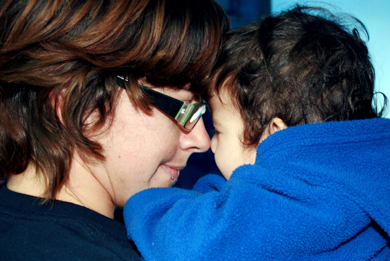
Shayna Horwitz, left, cuddles 4-year-old Jennifer
Harris and 17 fellow CSUF students joined other volunteers on this trip that, they said, touched their hearts. The volunteers arrived in a bus carrying baked hams, canned foods, bottled water, toiletries and other donations for the orphans. Since 2005, CSUF’s Volunteer & Service Center has been offering this community service effort with the Corazon de Vida (Spanish for Heart of Life) Foundation, an Irvine-based nonprofit orgnization that sponsors 14 orphanages in Tijuana and Ensenada.
More than 250 Cal State Fullerton students, faculty and staff have participated in the volunteer trips which expose them to an experience unlike anything they may have ever encountered, said Amy Mattern, Volunteer & Service Center coordinator.
They witness the poverty and plight of the orphans in Mexico and learn the reasons why there are so many children without a home or parents to care for them, and what Corazon de Vida is doing to help, she said.
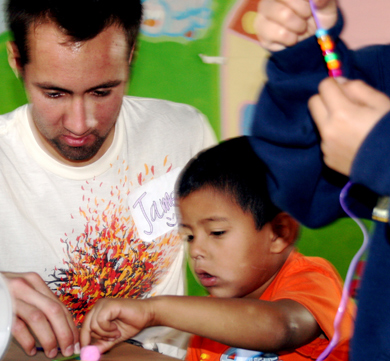
James McKenney helps an El Faro orphan complete a craft
“They also learn that they can get involved and make a difference either through sponsoring children, donating basic necessities to the orphanages or volunteering their time,”
Mattern said. “It’s a crushing experience to see children living without parents in small, cramped facilities with none of the luxuries many of us take for granted.”
James McKenney, a psychology major, has made two trips to Baja orphanages with the group and called the experiences “awesome.” “It helps to foster a broad perspective of the world,” said McKenney, who managed to give two El Faro children piggyback rides at the same time during his last visit. “There are children starving and dying in large numbers just 100 miles south of us, not to mention the countless other problems immediately surrounding us. Helping to fix these problems doesn’t require a lifetime of devotion, or a heart of gold, you’ve just got to get up and do it.”
Hilda Pacheco-Taylor, who grew up in Baja’s Puerta de Fe (Door of Faith) orphanage, founded Corazon de Vida in 1994. Funding for the orphanages come from private U.S. organizations like Corazon de Vida, churches and community groups.
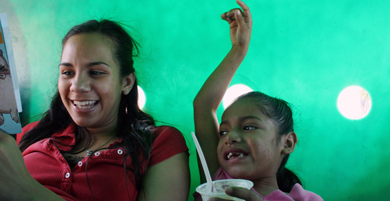
Melissa Ames, left, and Anna read in a playground tube.
“We keep the kids from going hungry,” said George Perez, a Corazon de Vida board member who oversees the 14 orphanages that are home to more than 700 children. “What we do is sustain life; that is our mission. These are kids nobody wants.”
The oldest orphan at El Faro is 17-year-old Alberto, a quiet artist who learned to make figures from copper wire and origami by watching others on the streets where he lived until two years ago when he became an El Faro resident.
“I don’t like to speak,” Alberto said in Spanish, as he turned copper wire into a butterfly. “I prefer to be alone and I create art usually when I’m angry. I started living on the streets when I was 6 and I think most people are too closed-minded.”
But, the orphanage is giving Alberto hope. He attends an art school and volunteers are helping him with life’s struggles, Perez said.
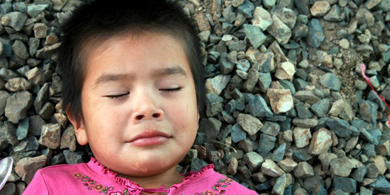
Deanna rests on a pile of rocks at El Faro
“A lot of these kids come from extreme hardships,” Perez
said. “They’ve lived on the streets and under bridges. They
have no family in their lives. A lot of these kids don’t even know
when their birthdays are.”
During the November visit to El Faro, which means The Lighthouse, CSUF
volunteers played with children in the dirt courtyard and on the play
set. Inside the orphanage’s dining hall, they made crafts with
the children, played games, read books to them, wiped their noses or
just held them.
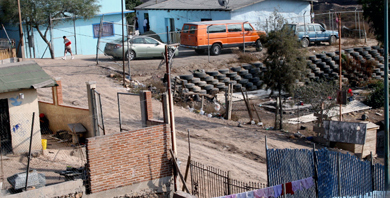
El Faro sits on a landfill in Tijuana.
Shayna Horwitz, a human services and American studies major who plans to pursue a master’s degree in social work, bent down to the concrete floor in a cramped dorm room at El Faro, where 4-year-old Jennifer was desperately trying to stand up.
Like a loving mother, she
wrapped the blind, autistic toddler in her arms, nuzzling her face against
hers.
“These kids have so little, but their hearts are filled with love,” Horwitz
said. “Spending time here is really a great experience.”
Student Impressions
Here is what students are saying about volunteering in Mexico
and making a difference in the lives of children who live at orphanages
in Tijuana and Ensenada:
Julissa Prado, sociology major and Volunteer & Service Center Corazon
de Vida project director: “The kids are just so grateful and happy
to have us here. … Although my parents emigrated to the U.S. from
Mexico before I was born, I always felt that I could very easily have been
born into a family living in poverty. Going to Mexico keeps me humble.
No one chooses the cards they are dealt in life. That is why I enjoy helping
people.”
James McKenney, psychology major: “Between the piggyback rides, the
futbol and just playing around, by the end of the day I was exhausted,
but I had a blast. I enjoyed watching all the other students interact with
the kids as well; everybody just seemed to have a good time. As college
students, in return for the awesome opportunities we’ve been given,
volunteering with Corazon de Vida is literally the least we can do to help
create positive change.”
Jeanette Nagy, sociology major from Sweden: “I could adopt one of
these kids. Even though there was a language barrier, it was easy to love
these children and have fun with them. It was a very giving experience
that I will absolutely do again.”
Roshan Patel, business administration major: “I wanted to see firsthand
how the children are living. It’s shocking. It’s a different
experience when I saw it firsthand, rather than on TV, where most people
see something like this. It’s like ‘wow,’ these kids
do need other people in their lives.”


